Service Information
We have
- 14 bedrooms with en-suite showers and toilets
- A bathroom (if you prefer to have a bath!)
- A main lounge area with a TV, DVD player and gaming console
- A smaller lounge area with a TV, books and board games
- A communal dining room, with small kitchen area for the young people to use
- Main kitchen – supervised by staff
- A Sensory room called ‘The Snug’ with sensory equipment such as lighting and bubble tube
- A relaxation room called ‘The chill out room’ – a cosy low light room with beanbags
- Visiting room
- Therapy and Meeting rooms
- Staff Offices
- Outside garden with sport area and vegetable garden
| Bedroom | Dining room | Lounge area |
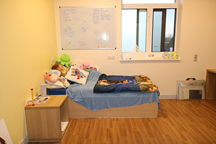 | 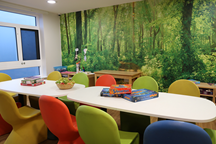 | 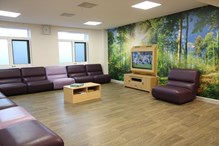 |
| Sensory room, ‘The Snug’ | Fidget corner | |
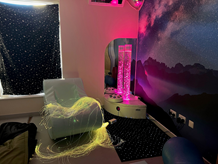 | 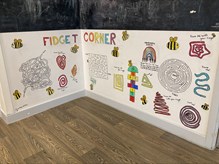 |
Family Ambassadors
Our Family Ambassadors are non-clinical professionals with lived experience of mental health services, who can work with you and the staff to support you in understanding your young person’s care.
Support is provided via phone calls or virtually through Microsoft Teams dependent on your requirements and convenience.
As a parent or carer, you have an expert perspective on the care needs of your child or young person. The ambassadors will ensure your voice is heard and that you are able to contribute to your child or young person’s care.
The family ambassador will continue work with parents and carers for up to four weeks after your child has been discharged.
For support and advice you can contact Poppy Ingram.
Email: [email protected]
Patient Experience
We would like to hear about your experience on the ward. We use iWantGreatCare, a health reviews website, to collect feedback on what patients think, monitor it and action where possible.
Go online to iwantgreatcare.org, if you’d prefer, ask the ward staff for a paper form to complete. It is very important that we hear from you about what has happened during your time with us as this will help us to improve things for other young people in similar circumstances, thank you.
What happens during your stay?
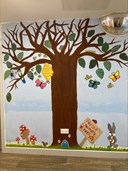
Your first few days on Poplar can be quite difficult as this may be your first time away from home, and often young people come to us after a crisis. Therefore, the nursing team will ensure your first few days are spent getting to know you and making sure you have all the information you need.
After around five days, there will be a meeting called a CPA (Care Programme Approach). This is an opportunity for you, your family and professionals involved in your care, to meet and discuss why you have come in to hospital, and plan what treatment and care will be offered during your stay.
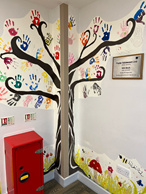
After this meeting, you could be discharged, or most likely a plan for treatment is made for you to stay in hospital for a short time. You will then be allocated a psychologist who will meet with you and discuss your therapy, assessments, and group programme. Not every young person will need the same treatment, and everyone’s care is individual.
Advocacy
You will have access to an advocate when you are on the ward. They
come every Wednesday to support you during your weekly clinical review meeting.
Advocacy is a process of helping someone to speak up for themselves, or making sure they are heard at a time when speaking up for themselves may be difficult. The advocacy service is independent from all other services and roles and is totally young person led.
What does an advocate do?

Advocates are there to support your choices. For example, they can:
- listen to your views and concerns
- help you explore your options and rights (without advising them in any direction)
- give you information to help to make informed decisions
- help you contact relevant people, or contact them on their behalf
- accompany and support you in meetings or appointments
An advocate will not:
- give you their personal opinion
- solve problems and make decisions for you
- make judgements about you
Education
As part of the structured programme, the unit provides 20 hours of educational provision per week. Poplar Education Unit is in the main hospital building and consists of three classrooms. It is supported by a head teacher, key teachers who are subject leads, and learning support assistance. The education unit is staffed by teachers from Essex County Council, and the unit is Ofsted Registered.
The unit follows the National Curriculum. All young people are assessed to attend our unit soon after admission, and each young person is allocated a key teacher. Part of the role of the education team is to liaise with a young person’s current school/college/education provider and work and progress can be shared to continue to support your learning whilst in hospital. They also support reintegration back into a young person’s own school/college. The education programme includes trips off the hospital site for educational learning. Parents/carers will be provided with regular updates on progress from the education team.
Our class and music rooms
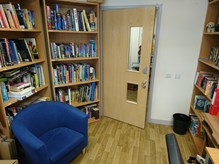 |  |  |
Expectations
Staff expectations of young people
The team would expect that you engage with the programme and support offered. You should be respectful towards staff and peers on the unit. You are expected to adhere to all boundaries and agreed behaviours whilst on the unit. We also ask that you should be mindful of others in language and behaviour. You should engage with your personal treatment programme. In an emergency, you will follow staff instructions to maintain your safety and the safety of others.
What young people should expect from staff
Young people should expect that staff should always be respectful in their behaviour and language. Staff should show a compassionate and caring attitude towards you and your individual needs. Staff on duty act in accordance with EPUT policy and procedure and are aware of their professional role.
Family/carers/visitors/professionals expectations
Staff will always remain respectful. Staff will liaise with others involved in your care where appropriate and adhere to all confidentiality and sharing of information policies. Staff will always safeguard you and be aware of Trust safeguarding policy and procedures. Visitors will adhere to the guidance provided on contraband items brought into the unit and shared with you. Families/carers will share important information with the team which may affect the management and treatment of young people. Visitors adhere to the unit guidelines regarding visiting, to support the operational activities of the unit. Families/carers will support you to adhere to the programme throughout your admission and support the treatment/ behaviour management approach that the team advise for you. Families/carers should expect a good level of communication regarding their young person and should feel involved in their young person’s care, where appropriate. Families/carers should feel able to approach the team for further advice or information about their young person.
We will always aim to meet your individual spiritual and cultural needs. We will discuss these at some point during the admission process, however, please ensure that you make us aware of any needs or requirements that you may have, including reading material, and prayer room facility.
Our unit aims to respect all aspects of cultural, ethnic and gender diversity. We will discuss your personal preferences at some point during the admission process, but we encourage you to raise any thoughts, concerns, or requests that you may have to ensure your individual needs are met.
Food
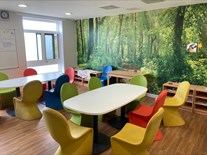
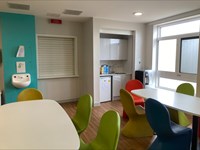
We have a selection of cereals and toast for breakfast, or young people can bring their own breakfast items.
Lunch is generally packaged sandwiches, wraps or salads. Young people can make their own sandwiches or toasties if they wish.
Dinner is provided food by a hospital catering company and this is cooked for you each day.
Twice a week we have a cooking group called ‘Pots and pans’, where one person will be supported by staff to cook dinner for all the young people.
Once a month we also allow a take away night, if people choose to order food to the ward.
Snacks
Each young person will have their own snack box where they can bring/buy food items and keep them safe on the ward. Young people can access their snack box at any time, however staff will work with you and your families to ensure you have a balanced diet.
Group programme and activities
Please speak to nursing staff as some items may be restricted.
Example timetable
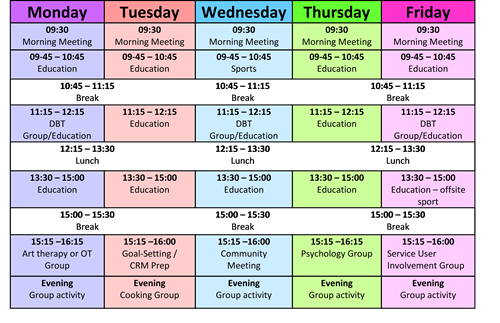
Keeping you safe
Observation
During the admission, all young people will be observed and monitored by the team. Some young people will have more enhanced level of observation than others depending on individual risks and needs. The team refer to the EPUT Observation and Engagement Policy and this will be referred to as level 1, 2, 3 or 4 observations.
- Level 1 – staff to observe patient once in every one hour
- Level 2 – staff to observe patient 4 times in every one hour at intermittent intervals
- Level 3 –staff to observe patient within eyesight at all times
- Level 4– staff to observe patient within arm’s length distance at all times
Oxevisison
Oxevision is a new technology that includes a regulated medical device which incorporates an infrared sensitive camera.
It helps staff visually confirm a patient is safe – and measure their pulse and breathing rate – without disturbing their sleep.
It can also provide other safety features that alert staff if a patient is putting themselves and significant harm to themselves.
Leave arrangements
During your admission, the team will encourage you to have leave away from the unit. Any leave will be decided with the team, the young person, and family/carers. Leave arrangements are generally planned in advance and will be agreed with family/carers in conjunction with a risk assessment.
Leave usually starts as escorted leave supported by staff/family/friends. A young person may be granted unescorted leave, which would need to be agreed by the person with parental responsibility and the ward team. You will be encouraged to take local area leave, and home leave as part of your treatment. This helps the team along with you and your family/carer to look at how well you are managing whilst away from the unit. We would ask that families and carers feed back to the staff how the periods of leave have been for everyone involved. This helps us to plan for further periods of leave, gradually building up time away from the unit. We would ask that you ensure you return from weekend leave by 9pm to ensure there is adequate time for this handover of information to take place.
Meet the team
We have a team of specialist mental health professionals that will look after you during your admission.
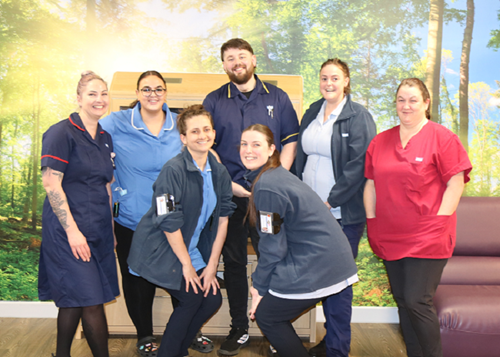
Mobile phone and smoking policy
Smoking
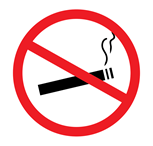
The hospital operates a No Smoking Policy in line with the Trust Policy and Procedures. This is an evidenced based policy, which promotes healthy lifestyles. The staff on the unit will support young people in smoking cessation and are able to prescribe nicotine replacement therapy and offer smoking cessation advice.
Young people will not be able to carry smoking related items on the unit. They will be held in the unit safe if they are brought to the unit until your parent/carer can collect them.
Mobile phone access
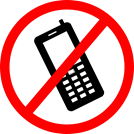
Young people can bring mobile phones onto the ward. The use of these phones is subject to a contract being signed in relation to their safe and proper use, as detailed below.
Phones will be available outside of the ward programme to encourage participation and concentration. This includes education, therapeutic groups and individual therapy sessions.
Mobile phone use must be appropriate, and not in a way which could cause harm to the young person or other young people and not in a way that violates the privacy, causes harm or disturbs another person, patient or staff member on Poplar Adolescent Unit.
The misuse of mobile phones by an individual leads to their initial 24 hour removal. Persistent issues will lead to them being permanently removed from that young person. They will then need to use the ward phone to maintain contact with friends and family. This will be under supervision to maintain safety.
If the young person declines to return the device to the staff team, then this could result in the person who owns and pays for the handset being asked to give permission for the device to be checked, although this will be carried out sensitively by the staff team.
If there is a serious safe-guarding risk concern, then the staff team may seek legal advice on how to access the information to be able to maintain the safety of the unit.
Mobile phones will not be used during mealtimes to promote social inclusion and social skills.
The recording and camera facility on the device will not be used whilst on the unit.
What can I bring with me?
It is important that you feel comfortable during your stay on the unit, however the unit is within a hospital site, and therefore we are required to uphold standards of health and safety and hygiene. Therefore, we would ask that you bring in a small amount of clothing (4 to 5 days’ worth). There are laundry facilities in the unit which young people have access to. We also have lockers where you can keep your valuables.
Items you CAN bring to the unit
- Nightwear
- Seasonal appropriate clothing (please include gym clothes for physical activities in the group programme)
- Two pairs of shoes (please include trainers for physical activities in the group programme)
- A small soft toy (if desired)
- Books to read, journal to write in, pens, puzzles, colouring books
- Small amount of money
Items NOT authorised on the unit
- Illicit drugs/alcohol
- Knives, razor blades, scissors, glass containers
- Aerosols
- Hair dye
- Age appropriate media (DVDs and Magazines)
- Lighters
Items which may be restricted on an individual basis
- Clothing with drawstring i.e. hoodies, tracksuit bottoms, pyjama bottoms.
- Make up with plastic or breakable cases.
This list is not exhaustive but is a guideline for families and young people of appropriate, useful, and restricted items. The Nurse in Charge or security nurse on duty will be able to guide you further if you have questions about property being brought into the unit.
Information about money on the ward
While there is no need for money on the ward, the hospital is next to Rochford square where young people can visit shops whilst on leave from the hospital. We do not hold responsibility for any money that you bring into the ward and trust that you will be able to keep this safe. We are able to store up to £10 in our safe, if you require further money we can arrange for this to be looked after by the Hospital Welfare department.
Contact details
- Address:
Rochford Hospita
Union Lane
Rochford
SS4 1RB